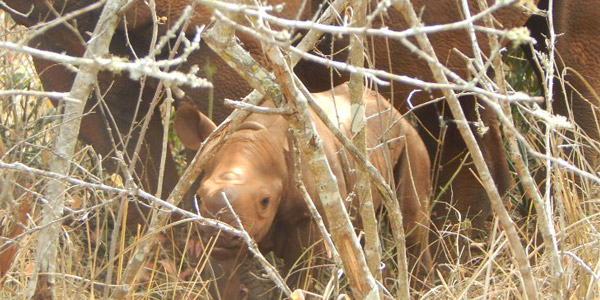27th September, 2017 10:16:19
The first wild rhino calf to be born in Rwanda in over a decade has been confirmed by Akagera National Park. This exciting announcement was made on World Rhino Day, September 22nd, and came only four months after 18 Eastern black rhinoceroses were successfully translocated from South Africa into the park. The historic translocation was led by African Parks, a conservation non-profit that manages national parks and protected areas on behalf of governments across the continent, in collaboration with the Rwanda Development Board (RDB) and with funding provided by the Howard G. Buffett Foundation. The People’s Postcode Lottery and the Dutch Government provided additional support to the project.

Image credit: www.newtimes.co.rw
While this is the first photographic evidence of the calf, the park’s dedicated rhino monitoring team initially sighted the young calf in August and it has been sighted regularly since. Based on this timing, its mother who has been named Ineza, would have been well in to her 15 to 16-month gestation period when she arrived safely in Akagera in May this year. Ineza was brought over from South Africa with her older male calf, which now at two and a half years of age has left his mother and found his own territory and independence in Akagera.
“The first rhino calf to be born in over a decade is a profound moment for Rwanda and its people, a country that is leading in its commitment to the conservation of endangered species” said Jes Gruner, Akagera National Park Manager. “The collaboration with the RDB in the restoration of the park over the past six years has made bringing back the Eastern black rhino, one the rarest subspecies on the planet, possible in Rwanda. Through our management and protection and collaboration with local communities, we’re working to safeguard the growth of an important population of rhinoceroses for the region”.
After six years of securing the park and essentially eliminating poaching, in the first two weeks of May this year 18 Eastern black rhinos made a 4,000-kilometre journey by cargo plane from South Africa to Kigali in Rwanda, from where they were transferred and successfully released in to Akagera National Park, which is a protected savannah containing excellent black rhino habitat. Tracked daily by dedicated monitoring teams, the translocated animals are prospering while this new calf brings their population total up to 19. In the 1970s the park was home to more than 50 black rhinos, but under the pressure of poaching their numbers were reduced until the last confirmed sighting of the species in 2007. This historic move has been a valuable restorative opportunity, expanding the range of a subspecies with fewer than 1,000 remaining animals across its range on the continent.
Credit: Akagera National Parks
6 Days, 5 Nights Travel Trip
This festive offer for EA residents only features a 5-night/6-day premium s...
15 Days, 14 Nights Travel Trip
Great choice, travelers! For our next adventure, we will be visiting the be...
15 Days, 14 Nights Travel Trip
"Welcome to Palakkad, the land of mountains, forests and rivers. This pictu...
6 Days, 5 Nights Travel Trip
Welcome to the stunning destination cities of Arusha, Ngorongoro Conservati...
Stay updated with our latest news!